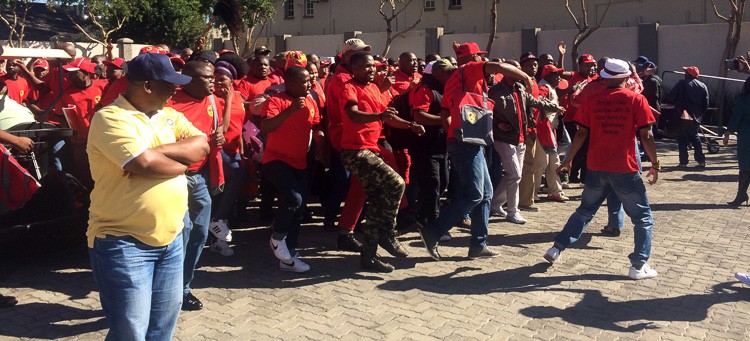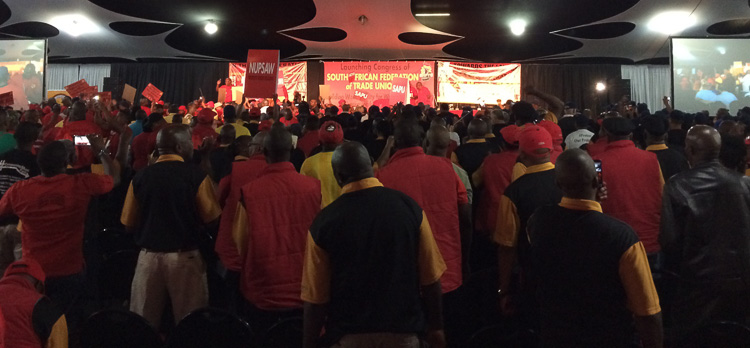
Workers danced and sang freedom songs outside the congress hall. Photo: Julia Chaskalson
22 April 2017
Nearly 700,000 workers from 24 trade unions have joined to form a new trade union federation. The new federation, named the South African Federation of Trade Unions (SAFTU), held its inaugural congress in Boksburg on Friday.
A total of 1,384 voting delegates from the 24 unions attended the congress to decide on the new federation’s name, logo, colours, agenda and constitution.
The mood of the congress was festive. For two hours before the formal proceedings began, members came together to sing struggle songs and dance in the courtyard outside.
SAFTU was formed last year by former Congress of South African Trade Unions (COSATU) general secretary, Zwelinzima Vavi. “COSATU forms part of the ruling elite that has brought our country to its knees,” Vavi wrote in the Steering Committee Report presented to delegates at the Congress. “[SAFTU] commits ourselves to working for the common good.”
COSATU currently has more than 2 million members, and is part of the ruling tripartite alliance with the ANC and the SA Communist Party.
“This is only the beginning of a long journey to unite South African workers and to end the fragmentation of the trade union movement,” Vavi told SAFTU delegates in Boksburg.
A National Union of Metalworkers South Africa (NUMSA) member told GroundUp: “This is a historical day, today.”
The central values of SAFTU include “independence, worker control and democracy, non-racialism and non-sexism, socialist orientation and militancy in fighting for the working class and the poor,” Raymond Mnguni, the chairperson of the SAFTU steering committee, told the crowd.
After the programme began, a question was raised by a delegate from the Democratised Transport Logistics and Allied Workers Union (DETAWU) about the proportion of female delegates in the audience. He asked if the SAFTU steering committee knew the number of female delegates and whether that number was properly representative, but the steering committee could not offer an answer. On stage, five people sat and ran the proceedings: only one of them was a woman.
Inside, the crowd seemed largely male. Male union members led struggle songs in the courtyard and all the union leaders who stood up to speak on the agenda were male.
Fees Must Fall leader Busisiwe Seabe had been invited to speak about student worker solidarity. But chairperson of the congress Basil Cele explained that KwaZulu-Natal student activist, Bonginkosi Khanyile would take her place. Consequently, there were no female speakers at all at the event.

A second issue raised in the first session of the congress was that of internal democracy. For unions like NUMSA and the Food and Allied Workers’ Union (FAWU), which were expelled from COSATU, the question of consensus and unity was very important. Vavi, Cele and Mnguni are all members of the “interim steering committee” but NUMSA delegates called for this body to be scrapped. “One of the important principles of worker democracy, at all material times, decisions are made by workers, not by small committees,” the NUMSA delegate said.
Jay Naidoo, the founding general secretary of COSATU, addressed the congress as a special guest. “[We are] a rich country, where we walk on gold and platinum and diamonds, but our people are still poor,” he said. “We need to represent the unemployed. We need to put humanity back in our economy, back in politics, back in our lives.”
He spoke about “building the organs of mass struggle, mass power” and “reconnecting” students and workers to see the realisation of “radical economic transformation”.
Khanyile mirrored this sentiment in his address later that day. “We support [SAFTU] wholeheartedly,” he said. “We are willing to fight with you.” He went on to say that workers “ought to participate in our struggles” and “make education fashionable again.”
The main issues raised on the first day of the three-day congress were internal democratic structures and how best to represent the interests of the working class. Outsourcing Must Fall spokesperson Weizmann Hamilton urged delegates to “resurrect the old ideological and political traditions on which the original COSATU was founded and which today is no more.”